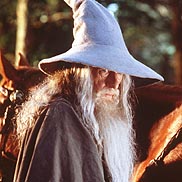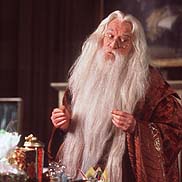January 11, 2002
Which Wizard Beats 'Em All?
By JAMES GORMAN
 |
| (New Line Cinema) |
| Ian McKellen as Gandalf in "The Lord of the Rings: The Fellowship of the Ring." |
 |
| (Warner Brothers) |
| Richard Harris as Dumbledore in "Harry Potter and the Sorcerer's Stone." |
It has been such a bad time in so many ways that it feels a bit odd to point out that it has been a very good time for wizards.
There can't be many people left who haven't read a Harry Potter book or seen the movie, who don't find the name Dumbledore at least vaguely familiar. And Gandalf, the great wizard of "The Lord of the Rings," has long been almost as ensconced in the popular imagination as Merlin.
This eruption of wizards is intriguing. Certainly it's a good thing for actors. Who would not want to stand on a stone bridge and confront an evil Balrog, raising a staff and intoning, "You shall not pass"? That's almost like singing Wotan in that other "Ring" story.
It also seems a strange coincidence that fantasy is having a popular surge in troubled times. But in fact all movies are fantasies, many serve as escapes from daily life, and there are plot twists as far from reality in "Ocean's Eleven" as there are in "Harry Potter."
Having more than one wizard in the multiplex does, however, raise one tremendously important question. Not, What is the meaning of fantasy? Not, Can the cinema ever truly capture Tolkien's work? Not, Are orcs true evil-doers?
No, the big question is: Who is your favorite wizard? Gandalf? Dumbledore? Merlin? The Wizard of Oz?
I'll give my answer up front, although I won't say why just yet. My favorite is not as famous as the ones I just mentioned. He is Ged, the hero of "A Wizard of Earthsea," by Ursula K. Le Guin. He may be less well known, but to anyone who would actually think about ranking wizards, he would be near the top.
I started thinking about this question partly because of the new movies, partly because I'm a longtime reader of fantasy and partly because I have a 10-year-old son. He lives and breathes questions like: O.K., in a match between the greatest ancient kung fu master and Jet Li, who would win? The best samurai of all time vs. the best European knight ever? How about all the modern armies vs. all the forces of Sauron?
This approach has an obvious application to the wizard question. Imagine a kind of World Wizarding Federation Ultimate Magic Smackdown. Gandalf vs. Dumbledore, no holds barred, one on one. Who wins?
Admittedly, this is a crude way to judge literary creations, but much more fun than the sort of thing you learn in college. It can be done with other characters as well. Monstro vs. Moby-Dick? Captain Kirk vs. Captain Nemo? Portnoy vs. Holden Caulfield? (I'm betting on Moby-Dick, Nemo and Portnoy.)
My money would have to be on Gandalf in the wizard duel. No question. I'd even give odds. Dumbledore is supposed to be powerful, but the world of Harry Potter just doesn't contain the same level of evil as the world of Tolkien. Book or movie, Voldemort is a minor league prospect compared to the Dark Lord (Tolkien's ultimate bad guy). Middle-earth is the big show.
My son and I went down all the wizard matchups. First off, the Wizard of Oz was disqualified, for obvious reasons: a wizard must be a person who has developed real magical power. That left us with a final four: Gandalf, Merlin, Dumbledore and Ged. I know we've left out somebody's favorite, but these were our choices.
He picked either Gandalf or Merlin (of "The Once and Future King" by T. H. White, who calls him Merlyn) as the overall winner, depending on whether we were talking about Gandalf the Grey, or his later, more powerful incarnation, who will be familiar only to Tolkien fans, Gandalf the White. My wife insists that Dumbledore is the best.
I kept wanting to vote for Ged, but I had to admit that he was more of a sentimental favorite, so naturally I had to come up with some other criteria so he could come out on top.
Best beard would have to go to Gandalf. (Ged is clean shaven.) Best hat would be tough, but I would have to vote for Dumbledore. (I don't think Ged wears a hat, certainly not a silly one.)
Perhaps, I thought, the wizards ought to be judged by their stories. I called Ms. Le Guin to talk to her about fantasy and its appeal. She has written eloquently about imaginative fiction and its seriousness. Rather than being primarily about good and evil, she said, "I think a lot of fantasy is an exploration of what power is."
Certainly the Potter books and "The Once and Future King" deal with the use and abuse of power, but both are gentle stories. The fear of unleashed power is not as near the surface as in Tolkien's world. I asked my son what was the scariest part of the movie "The Lord of the Rings." It wasn't any of the orcs or monsters. They were quite familiar to him from their descendants in computer games. Nor was it Sauron himself, the Dark Lord, the personification of evil.
He said he was frightened at only one moment in the movie, when Bilbo, Frodo's beloved uncle and a wise and gentle hobbit who held the ring for many years, turned on Frodo. It happens when he is tempted by the ring, now held by Frodo, and he lunges at his nephew, his teeth bared, his face twisted in rage and greed.
The transformation of a beloved friend was what scared him more than any special effect. The moment captured the potential for power to transform anyone, which Ms. Le Guin suggests is at the heart of much fantasy.
And this idea brings me to Ged. So far his story has been available only to readers, but he will be coming to the small screen because the Earthsea saga is being adapted for a mini- series on the Sci-Fi Channel.
I suppose Ged requires some explanation. He is an oddity among wizards, at least in modern books. Earthsea is not a variant of medieval England. Ged is dark-skinned, rare in the realms of English-language fantasy. And he is thoroughly human, causing much of the trouble that he has to fight against.
He is also, as my 17-year-old daughter pointed out, the hero of his own saga. (Not everyone in our family is besotted with wizards, but it's safe to say that realism has to struggle to keep up in our household.) Other wizards, like Merlin and Gandalf, tend to be wise guides to small, often foolish young heroes, some with furry feet, some not. Ged, on the other hand, is the hero who comes of age in the Earthsea books, and the struggle over power is a personal one.
In the end, however, that's a very dry reason to favor a wizard. Ged has all the wizardly chops. He can cause storms, transform himself into a hawk, make light and split rock. He speaks to dragons. You get the sense that he and his magic are connected to the very heart of the world.
And that is why he's my favorite: his magic. Wizards and their magic are inseparable. It is the nature of, and the rationale for, Ged's magic that make him so compelling. Gandalf and Merlin appear in their stories as already fully formed wizards, their magic taken for granted.
Ged, although he has power, has to learn his wizardry. (This raises the question of whether Harry Potter himself should be in this equation. But he's not a wizard yet.) What Ged learns is a language. Magic in the Earthsea stories is built on the true names of things, the words once used to speak his world into existence.
Words. Ged finds his power in language. That in the end is why he's my favorite and why his magic is so appealing. He's a writer's wizard.
Copyright 2002 The New York Times Company
![]()